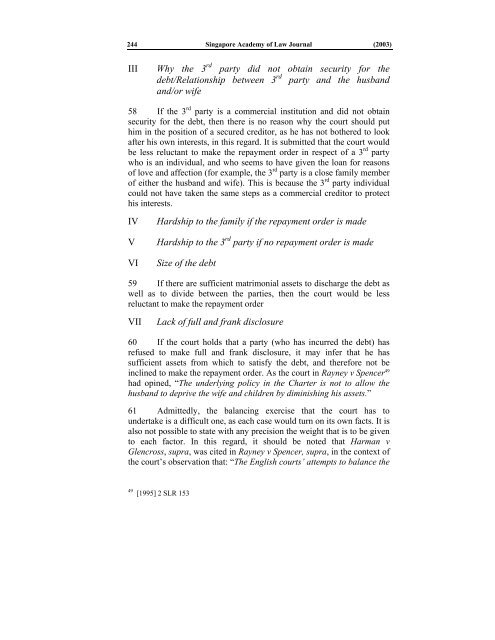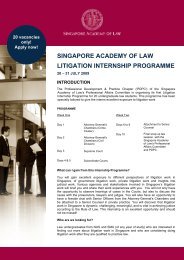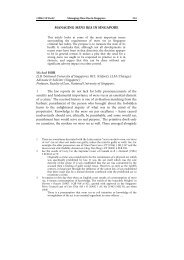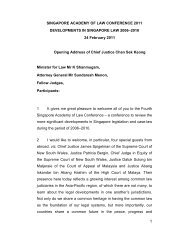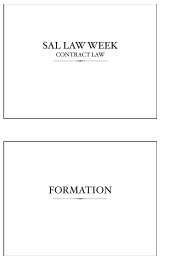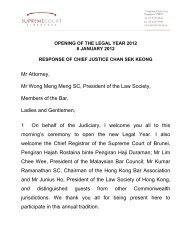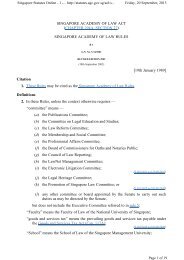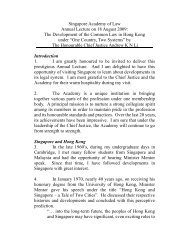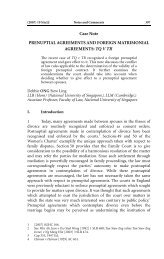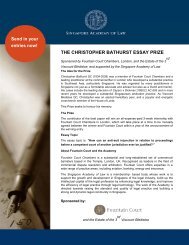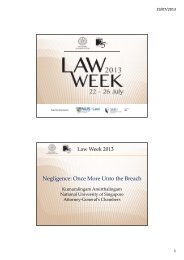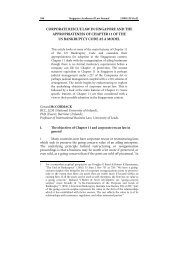View Article - Singapore Academy of Law
View Article - Singapore Academy of Law
View Article - Singapore Academy of Law
You also want an ePaper? Increase the reach of your titles
YUMPU automatically turns print PDFs into web optimized ePapers that Google loves.
244<br />
<strong>Singapore</strong> <strong>Academy</strong> <strong>of</strong> <strong>Law</strong> Journal (2003)<br />
III Why the 3 rd party did not obtain security for the<br />
debt/Relationship between 3 rd party and the husband<br />
and/or wife<br />
58 If the 3 rd party is a commercial institution and did not obtain<br />
security for the debt, then there is no reason why the court should put<br />
him in the position <strong>of</strong> a secured creditor, as he has not bothered to look<br />
after his own interests, in this regard. It is submitted that the court would<br />
be less reluctant to make the repayment order in respect <strong>of</strong> a 3 rd party<br />
who is an individual, and who seems to have given the loan for reasons<br />
<strong>of</strong> love and affection (for example, the 3 rd party is a close family member<br />
<strong>of</strong> either the husband and wife). This is because the 3 rd party individual<br />
could not have taken the same steps as a commercial creditor to protect<br />
his interests.<br />
IV<br />
V<br />
VI<br />
Hardship to the family if the repayment order is made<br />
Hardship to the 3 rd party if no repayment order is made<br />
Size <strong>of</strong> the debt<br />
59 If there are sufficient matrimonial assets to discharge the debt as<br />
well as to divide between the parties, then the court would be less<br />
reluctant to make the repayment order<br />
VII<br />
Lack <strong>of</strong> full and frank disclosure<br />
60 If the court holds that a party (who has incurred the debt) has<br />
refused to make full and frank disclosure, it may infer that he has<br />
sufficient assets from which to satisfy the debt, and therefore not be<br />
inclined to make the repayment order. As the court in Rayney v Spencer 49<br />
had opined, “The underlying policy in the Charter is not to allow the<br />
husband to deprive the wife and children by diminishing his assets.”<br />
61 Admittedly, the balancing exercise that the court has to<br />
undertake is a difficult one, as each case would turn on its own facts. It is<br />
also not possible to state with any precision the weight that is to be given<br />
to each factor. In this regard, it should be noted that Harman v<br />
Glencross, supra, was cited in Rayney v Spencer, supra, in the context <strong>of</strong><br />
the court’s observation that: “The English courts’ attempts to balance the<br />
49 [1995] 2 SLR 153


